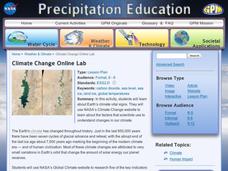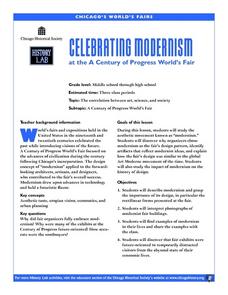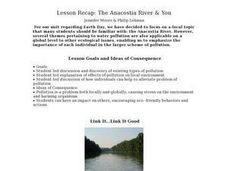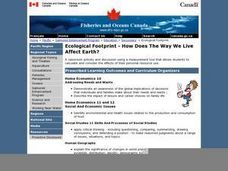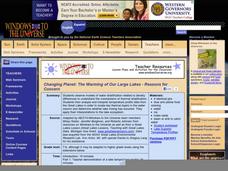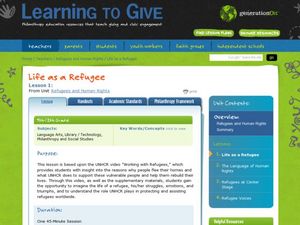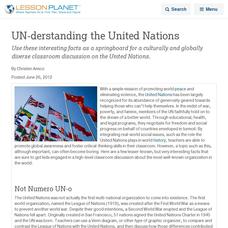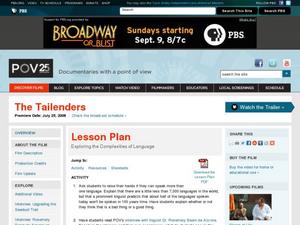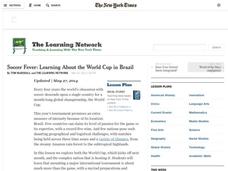NASA
Climate Change Online Lab
What are the key indicators that show scientists that our planet is in the fastest warming trend ever? Learners go on a WebQuest to examine the evidence for themselves. Following several links to NASA sites, kids see how the global...
NOAA
Currents
Learn how ocean currents are vital to humans and marine life. The eighth installment of a 23-part NOAA Enrichment in Marine sciences and Oceanography (NEMO) program, focuses on ocean currents and how they affect global climate. The...
Chicago Botanic Garden
Faces of Climate Change
You know global warming is real when your squirrel feeder is full of popped corn instead of kernels! Activity two in a series of five allows learners to explore climate change through the eyes of another. After briefly analyzing their...
Global Oneness Project
The Nature of Happiness
The U.S. Constitution states that the pursuit of happiness is an inalienable right. The United Nations' Global Happiness Index ranks countries according to the happiness of its citizens. As part of a discussion of the nature of...
Science 4 Inquiry
Fluid Streams Affecting Weather
The jet stream can reach speeds of up to 250 miles per hour. Scholars learn about the jet stream and ocean currents as they rotate through stations. They answer questions leading them to understand the impact these fluid streams have on...
EngageNY
Evaluating an Argument in The Big Thirst
Don't argue with me! Scholars first evaluate the argument in The Big Thirst. Learners work with partners to determine if the text supplies enough evidence to support the claim. They then complete a Tracing an Argument Note catcher for...
Curated OER
Looking Into the Mirror
Young scholars survey the impact of racial, cultural, and/or socio-economic intolerance in their own lives in relation to other individuals. They develop written and oral proposals to solve inequality and intolerance on a local, state,...
Curated OER
Celebrating Modernism at the A Century of Progress World's Fair
Students examine aesthetic movement known as modernism, discover why organizers chose modernism as World Fair's design pattern, interpret photographs of modernist fair buildings and identify artifacts that reflect modernist ideas, and...
Curated OER
The Anacostia River & You
Students are able to give examples of local and global sources of pollution. They explain why certain forms of pollution are detrimental to the environment. Students a create a poster promoting Earth Day's message of environmentally...
Curated OER
Lesson Recap: The Anacostia River & You - Biology Teaching Thesis
Seventh graders give examples of local sources of pollution and postulate reasons as to why local sources of pollution can harm the ecosystem. They address the following question in short answer form: "Why is litter/chemical pollution...
Curated OER
Ecological Footprint--How Does The Way We Live Affect Earth?
Learners demonstrate an awareness of the global implications of decisions that individuals and families make about their needs and wants. They identify environmental and health issues related to the production and consumption of food....
Curated OER
Changing Planet: Sea Levels Rising
Begin by showing a six-minute video, Changing Planet: Rising Sea Level as an anticipatory set. Pupils draw a topographic map of a potato continent. Finally, they will visit NOAA's sea levels online map and NASA's carbon dioxide...
Curated OER
Changing Planet: The Warming of Our Large Lakes - Reasons for Concern
Another A+ instructional activity on the impact of climate change comes to you from the National Earth Science Teachers Association. In this installment, learners model the stratification of water in lakes due to temperature differences....
Curated OER
Cartoons for the Classroom: Oh, What's the Next Crisis?
As scholars examine a simple political cartoon, they consider some of the crises of 2009: oil, foreign wars, energy, global warming, Swine Flu, etc. A list is provided for background information, and 3 talking points (or writing points)...
Curated OER
Life as a Refugee
Lesson 1 from a Refugees and Human Rights unit is based on the UNHCR video “Working with Refugees.” Pupils gain an understanding of the role the United Nations plays in protecting and assisting refugees worldwide and have an opportunity...
Curated OER
UN-derstanding the United Nations
Use these interesting facts as a springboard for a culturally and globally diverse classroom discussion on the United Nations.
Curated OER
Exploring the Complexities of Language
An interview with Dr. Rosemary Beam de Azcona launches a study of the complexities of language and how meaning changes across languages and cultures. The investigation continues as class members view clips of the film, The Tailenders,...
Curated OER
Educating Myself Benefits Others
Most upper graders don't realize that when they choose to attend college, they're benefiting the whole community. Invite them to explore how they, as educated individuals, can contribute to their family, community, and global society....
BW Walch
Wondering About the New Seven (Man-Made) Wonders of the World
Who determines the Seven Wonders of the World, and what criteria is used to evaluate these locations? Discover the efforts to promote cultural diversity and preserve man-made monuments during the world's first-ever global vote in 2007 to...
Global Change
The Carbon Cycle and its Role in Climate Change
So how does the carbon cycle work? Kids participate in a hands-on activity that allows them to understand the chemistry behind climate change and global warming. They act out the process of photosynthesis by labeling themselves as...
Earth Day Network
The Neolithic Revolution
With the abundance of food products we can easily access in our society today, it is easy to forget the toll this can take on our global environment. Young learners will discover how the transition to agriculture and domesticated living...
Pulitzer Center
Food Insecurity
Food insecurity, whether as a result of food scarcity or a lack of nutritious food, is a growing and serious problem in the world today. After discussing the concept of food insecurity, learners listen to an NPR radio broadcast on the...
The New York Times
Soccer Fever: Learning About the World Cup in Brazil
What an incredible collection of ideas for teaching about the 2014 World Cup in Brazil! This resource is packed with news articles and instructional activities on a wide variety of topics, from the global popularity of soccer and the...
Maryland Department of Education
The Concept of Diversity in World Literature Lesson 13: Unit Culmination - Symposium
To conclude a unit on the concept of diversity in world literature, class members conduct a symposium on "African Literature in Global Perspectives." In order to earn a spot on the panel, individuals craft an original thesis that...
Other popular searches
- Globalization and Health
- Cultural Globalization
- Economic Globalization
- Globalization and Nafta
- Globalization of China
- Effects of Globalization
- Globalization and Culture
- Globalization Culture
- Technology and Globalization
- Globalization Culture Video
- Globalization and China
- Esl Lessons Globalization


